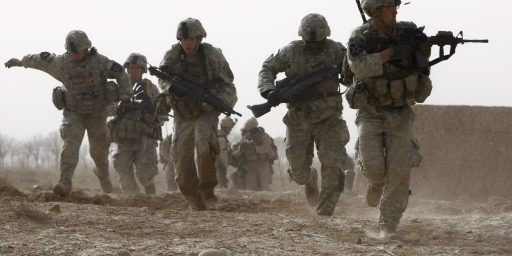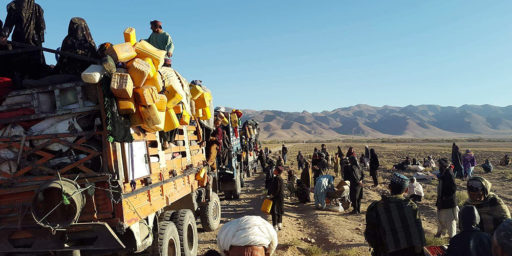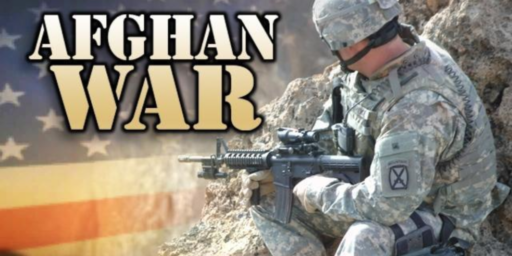US, UK Declare Victory in Helmand and Go Home
We've handed off operations in Helmand Province to the Afghanistan army.
We’ve handed off operations in Helmand Province to the Afghanistan army.
FP’s Column Lynch (“Don’t Look Now, But the Marines and Brits Just High-Tailed it Out of Taliban Stronghold“):
American and British combat operations formally came to an end in Helmand Province, one of the bloodiest theaters in the U.S.-led war against the Taliban and a primary focus of Obama’s 2010 surge of tens of thousands of American reinforcements charged with beating back the revitalized insurgency.
But there were no White House statements issued Sunday to commemorate the occasion, no press conferences convened to celebrate the day. Instead, U.S. Marines and British forces in southern Afghanistan quietly lowered and folded their flags in a solemn ceremony at Camp Leatherneck, the largest U.S. base to be handed over to Afghan authorities, and Britain’s neighboring Camp Bastion to mark the formal transfer of power to the Afghan Army’s 215th Corps. The two countries lost hundreds of troops in Helmand, but the situation there remains so dangerous that the precise timing of the base closures was kept secret for security reasons.
[…]
The landmark passed with little fanfare in Washington, reflecting the degree to which the Obama administration has sought to move beyond a deeply unpopular conflict that marked the opening front in the U.S.-led war on terrorism and took the lives of 3,476 coalition forces, including 2,349 Americans and 453 British nationals. The White House Twitter feed didn’t even mention Afghanistan, devoting its attention to assuring anxious Americans that there is little risk of the Ebola virus spreading across the homeland like some pernicious wildfire.
Military leaders often contend that they are reluctant to publicize the details about base closures or military handovers of power because of security concerns. But it was hard not to suspect that the administration silence on Sunday’s end of Marine military operations in Helmand was driven by concerns about about what the future may portend in Afghanistan, where the Taliban have retaken broad swaths of the country, including large portions of Helmand itself.
There is, to say the least, little reason to think that the Afghan military will be up to the task of holding the province. For their part at least, the Brits are up front about that.
British combat troops will not be deployed again in Afghanistan “under any circumstances”, Michael Fallon has pledged despite admitting the country could face more insurgency attacks.
The Defence Secretary warned there was “no guarantee” Afghanistan would be stable as UK troops pull out of the country and said Islamic extremism would continue there “for a long time”.
[…]
“We are not going to send combat troops back into Afghanistan. We’ve made that very very clear. Under any circumstances combat troops will not be going in there,” Mr Fallon said.
“Of course we’ll continue. Nobody’s walking away from Afghanistan. Nato’s made it clear that we will continue our support mission there and much of that now will be training and liaison and helping with intelligence and surveillance and counter-terrorism where necessary.
“But the answer is very straight – no, we’re not going to be recommitting combat troops to Afghanistan.”
He said Britain’s involvement in stopping Afghanistan from becoming a “safehaven for terrorism” meant it had been “mission accomplished” but warned the country still faced the threat of insurgency attacks.
“There is no guarantee that Afghan is going to be stable and safe. What I’m saying to you is that we have given Afghanistan the best possible chance of a safer future,” he said.
Discussing the UK’s overall mission, Mr Fallon said “mistakes were made militarily and mistakes were made by politicians” and added: “clearly the numbers weren’t there at the beginning [and] the equipment wasn’t quite good enough at the beginning.”
He added: “The problem of Islamic extremism was there before we went into Afghanistan and is going to be with us for a long time.”
It’s a sad state of affairs, but one that’s been obviously inevitable for five years or more. There’s a strong chorus of “we’re leaving too soon” out there and it’s powerful in the wake of the collapse of security in Iraq in recent months. But, absent an open-ended commitment, it’s not obvious what the alternative is. There will likely never be a good time to turn responsibility for security to a central government that has never displayed any ability to run the country effectively.





I think it’s been at least 12 years of obvious inevitability. And if you want to consider the Soviet experience, perhaps a few decades.
We lost this when we allowed a large scale raid on al Qaeda to morph into a war against the Taliban.
@gVOR08: We didn’t go into Afghanistan simply to root out al Qaeda, but also to remove Afghanistan as a potential safe haven, and the only way to do that was to remove the Taliban government that provided it.
We lost Afghanistan when we shifted focus to the needless and stupid 2003 invasion of Iraq. Whatever small chance there was of success in Afghanistan was wasted at that point.
Has there been a worse foreign policy blunder in American history than the 2003 Iraq war? None come to mind, but I might be suffering from recency bias.
Ah well, we gave it the good old college try. I am probably the one only one here who thought the Afghan surge was worth it, as against an immediate pullout in 2009, but that’s water under the bridge now. I’m hoping that DRONEZ!! will be enough to keep al Qaeda from re-establishing a safe haven in Afghanistan, but color me skeptical on that.
@Mikey: Agree, Iraq was the single biggest US government screw up since Buchanan failed to do anything about pending secession. But I will maintain that remaining in Afghanistan for 13 years with, as far as I can see no attainable goal and therefore no realistic plan, has to be #2. As you say, there was little chance of “success” even if we had not invaded Iraq.
I don’t fault Bush for invading Afghanistan, given the situation. I fault him very much for letting it go on and on under his absentee management. While I recognize the political constraints on Obama, I’m pissed about it still going on.
@stonetools: Actually, I was OK with the surge. I saw it as a necessary bureaucratic move. The military said they could “win” if they could just do so and so. Obama had to give them their shot. Even though he had to know that the only “win” we could get was somehow minimizing the problems we left in our wake.
@Mikey:
You said it, bud. Although I don’t think either war had much of a chance with Bush and Co running it.